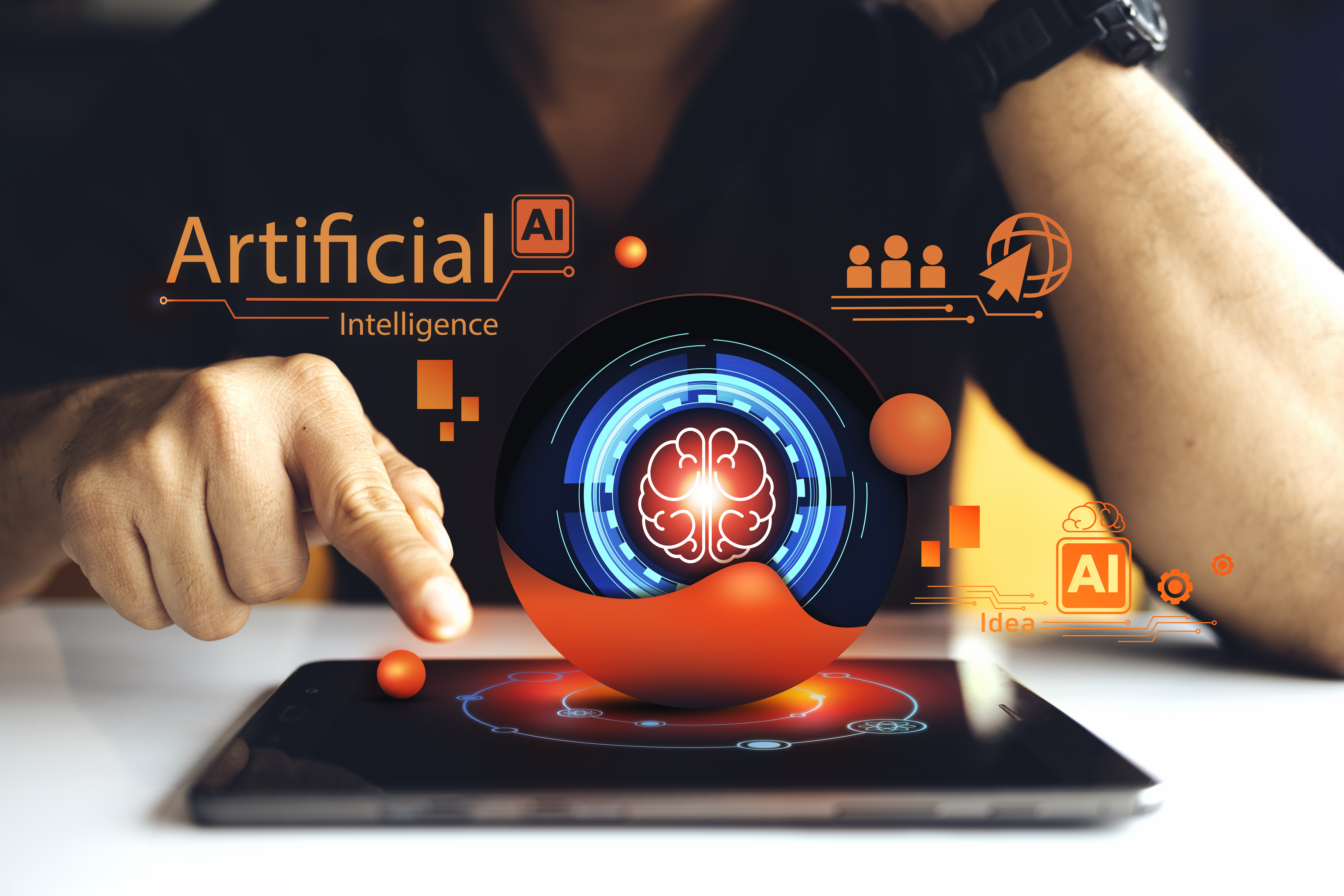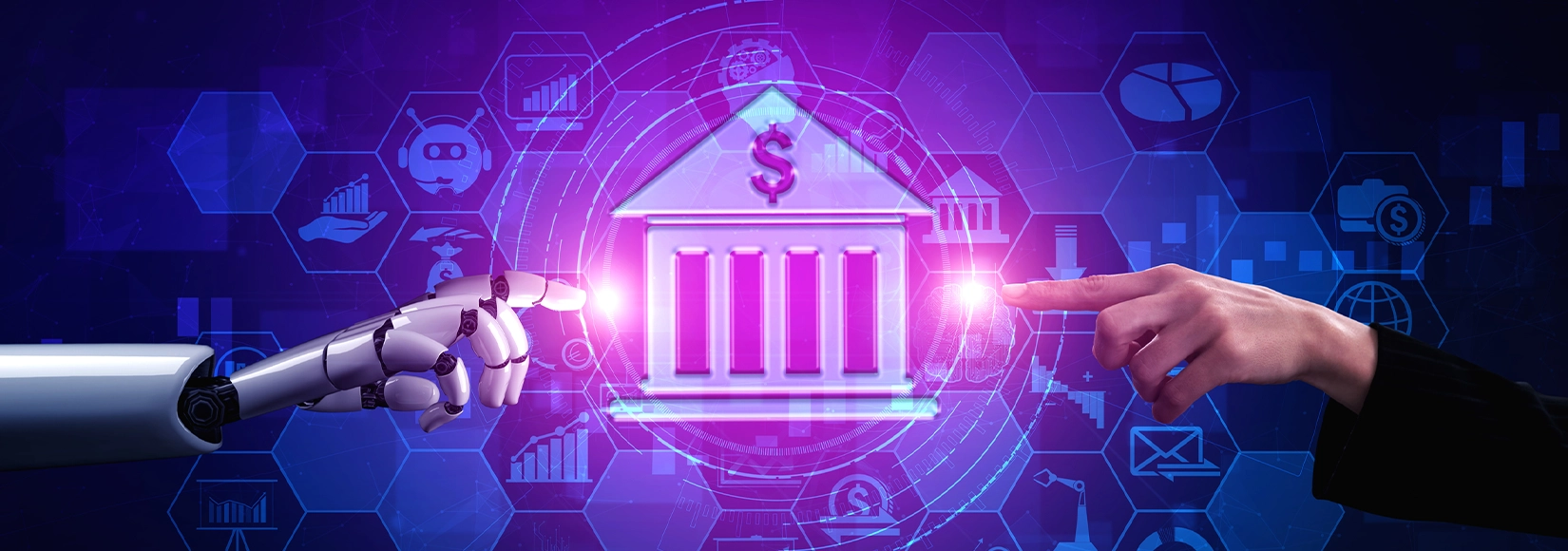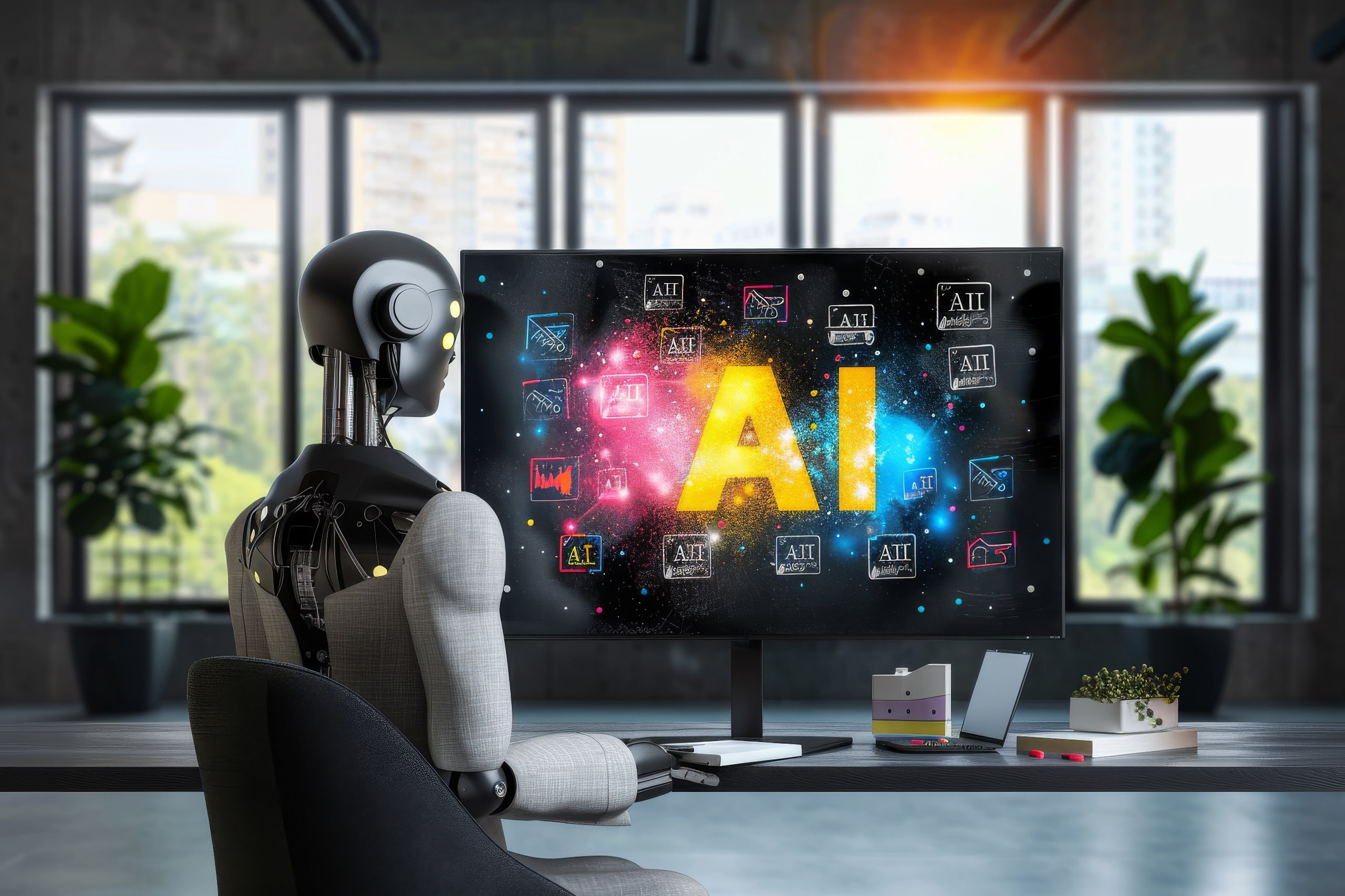The better the marketing, the higher the levels of success.
In the advancing world where the competition between businesses is increasing, and customer demands are fluctuating, adopting technology and artificial intelligence-driven marketing strategies has become crucial to boost your business sales and expand its domains. Today, there is no doubt that AI is taking over the world with its groundbreaking capabilities for streamlining operations and driving efficiency, productivity, and innovation.
In this blog, you will explore the Role of AI in Marketing and Advertising and how it is transforming the company’s marketing operations, reach, and sales.
Why do we need AI for Marketing?
The era of conventional marketing is almost gone, and now, the new business world tends to operate on modern programmatic advertising.
If we look at the market today, it is quite data-driven and it is not feasible for marketers to manually analyze such huge loads of data. On the other hand, artificial intelligence has this dynamic ability to rapidly process and analyze tons of data and build insights on the same. Therefore, to solve the problems of marketers related to data analysis, artificial intelligence comes to the front to process all the data and draw insights. These insights, in turn, help them to improve campaigns, set budget variations, and target audiences to get their best results. Moreover, the insights can help to make crucial business decisions, like checking which products get sold the most during the specific season so that the company can keep a high stock of that product.
Apart from this, artificial intelligence and machine learning algorithms analyze the previously shopped products, search history, and wishlists of the customers through the company’s applications and websites, then show them ads tailored to their wants and needs. For example, you may have wish-listed a certain product like a t-shirt on any online shopping app and then started seeing the recommendation of that product on every app you use, e.g., seeing the product ad on your Instagram or Facebook feed and so on. Seeing the product that a customer wishes to buy everywhere triggers the brain of the target customer, and he/she ends up buying it. Therefore, with the help of AI, we can market the products directly to the person looking forward to buy it, hence accelerating sales.
Following are the areas where AI can help in marketing and advertising:
- Building a vast database of target audiences.
- Insights on competitor’s marketing strategies and ads.
- Creating Ad creatives and copy.
- Predicting ad performance before launch.
- Adjusting ad budgets based on insights.
- Personalized messaging and emails.
- Showing tailored Ads to the target audience.
Ways to use AI for Marketing
Artificial intelligence can process large amounts of data relating to customers, current market trends, and competitor’s ads and draw insights, make predictions, and take actions based on the same. This specific capability of AI can drive sales and improve the company’s ad strategy and marketing.
Below are some key points for how AI in Marketing and Advertising is used:
Content Generation
The use of natural language processing (NLP), the branch of AI that helps the algorithms understand and interpret human language, and Generative AI, used to generate content, will speed up the content generation for the company’s marketing. Creating creative copy with graphics and getting ideas for organic or inorganic marketing, artificial intelligence can take care of it all.
In addition, based on data-driven insights, AI can also create personalized messages and email marketing content for the customers and target audience. Thus, AI in Marketing can help with both content generation and personalization.
Automation
AI automates most tasks like taking notes of meetings, categorizing incoming customer requests, scheduling meetings, summarizing articles, research, email marketing and administrative work. This saves a lot of marketer’s time and enables them to focus on more strategic tasks or make decisions that can help the business in boosting sales. Moreover, this automation drives smooth and intelligent workflow in the organization.
Data Analysis and Visualization
As mentioned earlier, AI can process huge amounts of data and draw insights in the form of charts and graphs. These insights help the marketers to get the bigger picture, thus keeping the guesswork out of the process and enable them to make crucial data-driven strategic decisions related to sales and advertising. Further, by analyzing customer data, like customer shopping data, customer care recordings, and feedback, marketers can know the sentiments of the people about their brand.
Reputation management
Elegantly handling negative remarks on your brand’s name is a much-needed task for the organization to build trust, accountability, and good relations with the customers and audience. Monitoring such negative comments in real-time and choosing the right brand ambassadors and platforms for marketing is what AI in marketing and advertising can benefit you with.
With artificial intelligence managing your social media direct messages and customer reviews on various online platforms, it will automate reputation management and provide quick responses to all the comments, especially the negative ones. AI then passes the complex complaints to the respective customer care team and gets them solved as soon as possible. Thus, AI provides a smooth customer experience and manages the reputation of the company well.
Multilingual Advantage
AI can help in providing customer service or creating ad campaigns in multiple languages that would increase the organization’s interaction with a large base of customers using different languages. This would help them reach a wider audience and strategize relevant ad campaigns according to the region and languages of the target audience.
ChatBots
AI ChatBots or conversational bots can be integrated into the company’s app or website as virtual assistant for the customers. They can guide the customers through the company and its products based on their requirements and can also solve any queries related to their purchase, payment, etc. Moreover, these chatbots can collect data based on their conversation with the customers, which can be further utilized for marketing strategies and schemes.
Predicting Customer Behavior and Ad Success
Based on all the customer data, including purchases, time-on-page, customer engagement metrics, emails open, wishlists, etc. AI algorithms can predict sales and customer responses towards any company’s discount schemes or ad campaigns. Furthermore, it also helps in recommending which platforms or media are better suited according to the company’s requirements and its customer base. For example- while using Google Ads, you’d have come across an AI feature that assists in the auction process. Hence, such AI-powered forecastings would help marketers develop dynamic ad strategies and campaigns that will boost the return on investment (ROI) and sales of the company.
Enhancing Customer Experience
By providing AI-backed personalized recommendations of products, conversational bots that help customers with their queries and guide them throughout their purchase, and more innovative features like AI-powered virtual trial rooms that help customers try outfits virtually, AI offers an amazing customer experience that satisfies them and turns them into the regular customers that trust your brand, its quality products and services. Moreover, this helps in the brand establishment and enhances your brand reputation.
AI Technologies Used in Marketing and Advertising
There are different AI technologies that would be used to develop an AI algorithm that would automate most of the tasks, and provide personalized experience to the customers. For instance, techniques like sentiment analysis, semantic search, and name-entity recognition would help you get targeted insights based on your industry and company needs, while natural language processing would help you develop automated content generation and conversation bots to improve your customer engagement. Below are the technologies that would be used to create AI for Marketing and Advertising.
Machine Learning:
Machine learning is the technology of “making the machine learn.” Machine learning works by inputting large amounts of relevant datasets into the machine and letting the algorithm learn from the same; it also helps the algorithm recognize the underlying patterns to predict the outcomes of the inputs accurately. AI-ML models get smarter and more accurate as they process more data over time.
Natural Language Processing
Natural language processing(NLP) is the AI technique that helps machines understand and interpret the meaning of human languages. It helps machines respond to humans just in their languages. One of the biggest examples of an NLP tool is ChatGPT, which generates great responses to our text inputs. Natural language processes have revolutionized the way we interact with machines. Virtual assistants, chatbots, speech recognition, and most such technologies use NLP. Thus, NLP can be tremendously useful in marketing and advertising.
Semantic Search
Rather than just matching keywords, semantic search algorithms are critical in NLP, as they help in retrieving information from the database or internet after understanding the context of what the user has input, allowing for more accurate and relevant searches. Thus, by providing more relevant and appropriate results, semantic analysis improves the overall search experience for the users.
Neural Networks.
Neural networks are ML techniques that let machines work in a similar fashion to our brains. Just like our brain has neurons that receive and pass information to each other, neural networks in machines have artificial neurons that have a certain threshold value and weight. When the artificial neurons reach the threshold, they get activated and pass the information to the next artificial neuron. They enable ML models to provide more precise results with time.
Name Entity Recognition(NER).
Name-entity recognition (NER) helps the machine recognize named entities like persons, places, or things like CEOs, celebrities, renowned places, etc, in a large dataset, even if they are misspelled. NER acts as a key function for generating graphs for knowledge as they establish relationships between entities in order to draw context and insights from the data.
Sentiment Analysis
Sentiment analysis allows the machines to understand the sentiments of the customer through their review and feedback. ML models analyze sentiments in every aspect that is extracted from the data and provide them scores from -1 to +1. To provide an overall sentiment of the brand, all the scores are aggregated. This can be highly beneficial for the company’s reputation management and AI customer care bot and gives you an idea of how satisfied your customers are.
Examples of Companies Using AI for Marketing
Many big companies use AI for marketing and advertising and for providing personalized recommendations to their customers and target audiences. Following are the examples of three of them:
Netflix
Netflix provides movie recommendations to watchers based on the watch history of users. Suppose a person has watched movies related to one specific actor, then netflix’s algorithm would automatically start recommending more movies and series of that particular actor, or if a viewer watched comedy movies and shows, the algorithm will recognize it and recommend similar comedy shows. This aligns well with the fact that it is important for marketers to send the right message to the right person at the right time.
Spotify
Similar to Netflix, the leading music platform- Spotify also uses AI to understand a user’s music interests, favorites, podcasts, purchase history, location, brand interaction, etc, to recommend more media and promotional messages relevant to the listener’s taste. Automated curated messages will help in converting the lead as the recommendation or marketed media would be tailored to the person’s requirements.
Amazon
Amazon, a popular global e-commerce app, uses AI algorithms to predict its sales and analyze the vast customer data, including their past purchases, search history, etc., using predictive analysis Amazon shows the products that the target customer is most likely to buy in the product recommendation section. Moreover, this helps the marketing teams to analyze which products are most likely to be sold the most, thus predicting sales.
Thus, AI-driven marketing helps in providing tailored recommendations to customers, increasing conversion rate, customer satisfaction, and the overall success and ROI of various marketing campaigns.
Benefits of AI in Marketing and Advertising
Businesses that identified the need to incorporate AI in marketing and advertising departments and made investments in building AI-marketing solutions tailored to their needs must have encountered many advantages.
Following are some of the benefits of AI for marketing purposes:
Smarter Decision Making.
Companies using cutting-edge marketing tools can get to see the impact of their marketing efforts in real time and adjust their marketing strategies accordingly. AI data platforms can create and run ads and process the generated data faster than humans, which boosts efficiency and saves a lot of time for the company. Moreover, the automated generation of personalized content reduces stress on marketers and allows them to focus on developing even smarter and more intelligent ad strategies that would drive business sales.
High Return-Of-investments (ROI) on Ad Campaigns.
When using AI, the data-driven preferences of the customers are acknowledged, the right media buy platforms are chosen, and ads and schemes are run in accordance with those actionable insights; modern marketing solutions help businesses yield a high return on investment (ROI), ensuring they are making the most out of the AI solutions.
More Accurate Measurement of KPIs.
Any ad campaign generates more data than what humans can analyze; therefore, drawing insights from such vast data is difficult. On the other side, AI-powered dashboards can categorize the insights based on the marketing campaigns, therefore allowing marketers to analyze the success of their efforts according to the tactics used, which would let them figure out what works for them and what does not.
Enhanced Customer Relationship Management (CRM).
By automating routine tasks like preparation of customer data, providing virtual assistants to customers, and personalized messaging and emailing, AI in marketing and advertising helps in providing a tailored and smooth experience to customers thereby building a great relationship with them. Moreover, quick problem resolution, reducing human errors, and identifying at-risk customers further add to managing the customer relationship.
Getting Deeper Insights From Customer Data.
By studying and analyzing customer data properly, teams can identify their areas of improvement and work on filling holes where the company is lacking. By deeper understanding of the customer base and target audience using prediction, prescriptive, and sentiment analysis, organizations can connect better with customers, gaining their trust, which would also help in brand establishment and boost sales.
Challenges for AI in Marketing
Incorporation of AI into marketing systems and leveraging its benefits seems easy. However, it still comes with certain challenges that should be tackled for effective AI use. Below are some challenges in the development of AI for marketing purposes.
Training AI Solutions.
To build a smooth and groundbreaking AI technology, training it with the help of expert data scientists and AI developers using a rich and vast historical dataset on customer details, preferences, and sales is a task that must be done to integrate an accurate AI model into the existing company systems.
Ensuring Data Quality & Accuracy.
The quality and accuracy of the AI algorithms highly depend on the quality of data it has been trained with, and the availability of such a large high-quality data set is another challenge that comes up because the datasets available would mostly have missing values, insufficient or low-quality. To tackle this problem, effective data cleaning, validation, and data governance must be ensured.
Adhering To Privacy Regulations.
To train AI algorithms for marketing, mostly the personal information of the customers is used; therefore, there must be compliance with privacy-related laws to protect the privacy of customers, failing to which can lead to the imposition of hefty fines and reputational damage for breaching sensitive data and risking the safety of customers.
Build AI-powered Future Ready Solutions for Marketing and Advertising.
To tackle the challenges mentioned above, you must hire a company that is expert in AI development, integration, and consulting.
If you want to build such an advanced AI marketing solution for your business, look no further because Build Future AI– The Best AI Development Company, brings you amazing opportunities to boost your business sales and growth with the help of AI.




